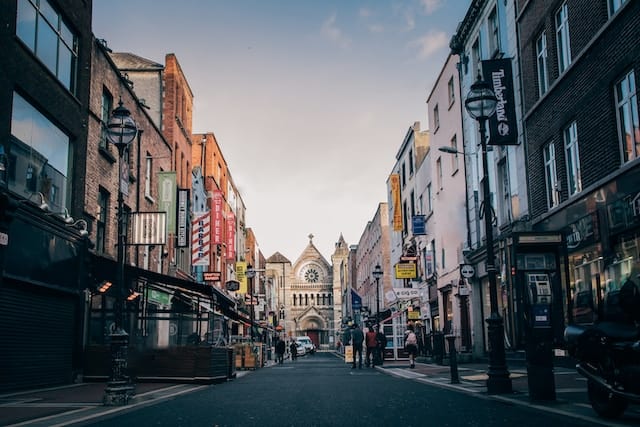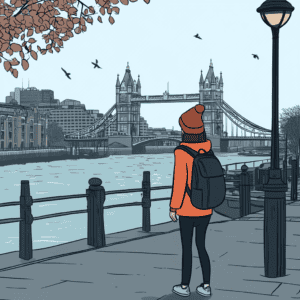Get a Crowning Medical Education at Royal College of Surgeons in Ireland (RCSI) in Dublin

- Originally published
- Last updated on July 24th, 2023 at 01:03 am
Table of Contents
Royal College of Surgeons in Ireland is the oldest, and one of the most respected, medical schools in the country, but what is Royal College of Surgeons in Ireland like? With its #1 ranking for “good health” and location in the heart of Dublin, do students here enjoy a good work-life balance? Will they find a place to work as RCSI graduates? And are they happy with their medical training? We hunted for the details and talked to current students and recent grads to get the down-low on the inspiring culture and general mojo of the place. Here’s what we found.
(And remember to check out the first steps toward how to go to college in Ireland if you haven’t yet).
Royal College of Surgeons in Ireland Facts and Figures
A Note on Names: Royal College of Surgeons Ireland is a school for healthcare professions. It has provided education and training since 1784. Don’t get it confused with the Royal College of Physicians of Ireland, a professional organization overseeing medical standards and practices in Ireland.
Degrees: MB, BCh, BAO (honors)
Majors: Medicine, pharmacy, physical therapy
Location: Dublin City, Dublin
Cost for out-of-EU: €56,135 for medical, including the National University of Ireland fee of €135. Pharmacy and physiotherapy tuition and fees for 2021/2022 are each €18,415
On-campus housing cost: €6,820-€15,650
FAFSA Funds: Yes
Abroad from abroad: Yes, Erasmus in 33 countries and clinical electives abroad.
Student body: 4,400 total students from 94 countries. 60% international students, with many spaces reserved for non-EU students.
Five adjectives: Professionalizing, global, collaborative, organized, supportive
RCSI Students Around Dublin
Notice Royal College of Surgeons in Ireland comes with a bullet-riddled, grey stone campus, once occupied by Irish independence fighters during the Easter Rising.
However, it goes back even further, to the mid-15th century when the first royal medical guild was incorporated in Britain or Ireland. The college was given a Royal Charter in the late 18th century and kicked off its modern presence on the south side of the River Liffey in the Dublin city center. Today, there are satellites in Dubai, Bahrain, Perdana, and Penang (those last two are in Malaysia), where you’ll find some of the same degrees.
In Dublin, the original RCSI is a few steps from the Luas green line light rail train at St. Stephen’s Green, located on a broad thoroughfare with bike lanes, rental bikes, and plenty of buses. Dublin is compact, and living in the city center usually means walking is the transportation mode of choice, but students looking to save on Dublin’s high rents will find public transportation a lifesaver. Its central location can be an advantage for students looking for a diverse and energizing campus, as well as a home base outside the pricy center.
But there are advantages to staying in the centre. For example, students can easily walk over to St. Stephen’s Green, a chill lunch spot where the world melts away. Enclosed in the 1600s, the park was once private. Now it’s a public oasis surrounded by stately Georgian homes where you can get your reading done while people-watching.
The campus grounds were very modern and clean and easy to navigate. Super central in the middle of the city so easy to get to/commute to if you live in Dublin. I’d highly recommend this college I had an amazing experience there.
RCSI backs to a large shopping mall with multistory shops enclosed in a glass-topped Victorian arcade. While unassuming from the outside, inside wrought iron streetlamps punctuate the green and white interior, hosting a mix of offerings from the cheesemonger to Game Stop and Benetton.
If you didn’t get enough shopping, the commercial center of Ireland, including Grafton Street, with its pedestrian-only tourist shops, gelato bars, and buskers doing covers of Van Halen can also distract you from the amount of homework you’ll have to tackle later.
Just a block off campus, you’ll find everything you could ever want to make your surgical labs fade into the background: vegan cookies and cream sourdough doughnuts at The Rolling Donut, handmade noodles at Xian Street Food, and iconic Bewley’s where you can grab a morning cappuccino and croissant under towering stained-glass windows. Once a tea importer with multiple locations (James Joyce was a Bewley’s regular), the Grafton Street flagship was described by one poet as a place where “in a shadowy corner, a hungover ill-natured poet would lurk studying the day’s racing form.”
Of course, there are two coffee shops on campus for students needing to replenish their caffeine between classes: Remedy is in the basement of one building, and Starbucks beckons in the other. Student catering also provides meals at a more reasonable price than the surrounding central city.
Campus + Housing
Large lecture theaters, with a basement restaurant, pool room, and relaxation spaces with television – RCSI has come a long way from its original Georgian lecture halls. It sports two main buildings on its urban block housing classrooms, but also recreational facilities, study spaces, the student library, dining halls, and labs.
Across the street, there’s a state-of-the-art gym where you can try indoor cricket or just ride an exercise bike. In this modern building, there’s the college’s largest lecture hall, an auditorium seating 500 students, and a library. Part of the library features a completely silent area so you can focus.
There are also expansive labs and surgical training facilities in the building where students get practice using models, biological materials, computers, and imaging tools. Is it trauma day yet? No? Well, it’s coming, and you’ll be able to show off skills as well as strut what you learn later at upcoming competitions for the steadiest hand. In 2020, RCSI hosted a surgical skills competition attended by future suturing champs from six additional universities.
The classrooms pale in comparison to the suite of simulation and exam rooms where students work on their clinical skills before seeing patients in their rotations for the first time. It’s the largest in Europe, turning out students who say they feel confident in real-world patient care as healthcare professionals right from the beginning because of the emphasis on practical clinical skills they get from RCSI.
Freshers’ fortnight is an orientation program that acquaints newcomers with the resources of RCSI as well as their classmates and is where many say they made the friends they kept for the duration of their degree programs.
My uni helped us in getting the IRP (Irish Residence Permit) by giving us appointments. My friends in other colleges didn’t get this. They also provide all students with apple laptops to help in their studies.
International students often find they can enhance their educations and streamline a demanding study schedule by living in campus accommodations.
Mercer Court is a former mental hospital around the block from RCSI and a few steps from groceries and the library. The two-minute stroll to campus is offset by students’ general distaste at the bare-bones accommodations, with large communal spaces that can be unkempt, according to students. Students seem to be grouped by nationality, though there is no roommate matching. You also won’t find meal plans here.
However, students feel these less-than-perfect accommodations are offset with one big perk that you do get: 24-hour security. Many students said they appreciated that perk the most.
Learn to cook. There aren’t really meal plans in Ireland like in the US and eating out is expensive. I get back from the hospital late so it’s a bad habit to just get take-out food and spend money.
Big communal kitchens and living rooms allow students to socialize and share downtime before they bail to single rooms. While none of the student accommodations in Ireland seems to wow us (they’re all big on cinderblock walls that give off vague jail vibes), RCSI’s typically Irish dorms are nice, new, functional, and spacious.
While not in an area of bars, the central city is compact and busting with energy even at night. Light sleepers are the worst candidates for student accommodation but those embracing their new city life may appreciate rolling out of bed and jetting out the door for class.
New Mill, clean-cut and further away, is a renovated student accommodation that can be easily walked in under ten minutes, meandering west through indirect lanes past St. Patrick’s Cathedral, row houses, and the ground-floor shops of the urban neighborhood. Both residences offer twin, single, and rooms with kitchenettes.
Off-campus, RCSI offers some student housing suggestions in private student accommodation at similar prices just a few blocks from their classrooms, but new students may feel underwhelmed at the lackluster housing at high rates. One of Dublin’s largest student obstacles is its increasing downtown gentrification, leading to priced-out students scraping to live near college or joining with classmates to rent a larger house further afield.
Student Life and Activities
The student union and resources available to students feel superior. While not many students we interviewed can compare their experience to other universities, all gush about the support they get from RCSI. From a white-coat ceremony that welcomes new students into the medical profession, students are enveloped into an international team with services that are designed to elevate the team – and make your journey easier.
Balls, Halloween events, lectures, study help, a welfare officer, and student support for younger students. For instance, seasoned older students help show newcomers around the hospital environment, showing them how to navigate clinical practice. Student society support can help students in their clubs. Academic support helps students pass exams. Events officers can help you host events, even if you’re not part of a student society.
Medical school is tough, and so is RCSI, but its students say they get the most help as international students compared to any other school in Ireland. They’re overwhelmingly happy to recommend RCSI for support, be it for international issues like matching back in their home countries to support in student societies.
What it’s like Stydying at Royal College and in its Medical Programmes
Year-by-Year Program
For Americans and Canadians looking to return home, the well-established pathway to North American residency program has staff that can offer advice and position students for placement starting about halfway through the program. High placement rates speak to its success. For Americans three years into their studies, the Center for Mastery: Personal, Professional, and Academic Success Office (CoMPPAS) gets the job done.
First-year students take chunky modules like Foundations for Practice (15 credits) and The Body: Movement and Function (10 credits). There are electives starting in the second semester.
Years one and two focus primarily on anatomical systems – the cardiovascular system followed by the endocrine system, for example.
Everything I got in class was well-organized. It was easily understood and fit into the overall curriculum. I felt like the entire program worked together and that was really impressive.
This deliberate training is lengthier than U.S. medical students get. It will also focus more deliberately on clinical diagnosis in a variety of situations with and without the newest technology, focusing on making students the best clinicians they can be in every future medical theatre.
One RCSI video tells the historical narrative of a student who advocated for anatomy to be taught based on practical surgical knowledge, and that approach is echoed as students work their way through the body through the lens of a surgeon. They’re proud the student advocate won his case and they’re the happy recipients of a deliberate curriculum that emphasizes every system of human health and wellbeing.
Cases and systems dominate until year three, when clinical medicine, simulation, and student projects start to bring components together and incorporate soft skills, like communication, and professionalism.
Our classes are definitely unique. One to three profs can participate in giving a single lecture. They cover all the important details we need to know. Through I’ve had issues with some professors not writing much on the slides. And some only use pictures (especially anatomy lectures) without a single word. This means I have to write everything the prof says in order to study them later.
Year four increases time in practice with students “anchored” in a clinical team within a teaching hospital. By their fifth year, students are heavily immersed in clinical practice, getting experience in a teaching hospital and taking on a clinical clerkship in one clinical discipline. There is a preparation course for internship practice, and CoMPPAS works from years three to five making sure North American students looking to complete residencies abroad are prepared to succeed in their placements.
The staff and professors were great at their jobs and I learned a lot. I’d definitely recommend RCSI to others.
Residency and Looking Back at an RCSI Education
Lectures, tutorials, and lectures form the backbone of RCSI’s medical education, but the school promises an array of learning formats that lead to, according to students, a thankfully diverse curriculum where many kinds of learners feel supported. There are large lectures, but as students progress, the mix increases, exposing would-be clinicians to seminars, workshops, clinical cases, and lab activities.
Some students spoke very highly of the residency preparation they received at RCSI, saying most of their classmates matched at their top choices back in the U.S. However, others complained about increasing class sizes and difficulty maintaining quality in the hospital setting because of the size of student teams.
While medical school programs starting at the undergraduate level can be five years in Ireland, a sixth year is common depending on students’ previous qualifications, including chemistry and biology.
Overall, RCSI is a practically-minded medical school with an emphasis on practical preparation and turning out world-class practitioners who are competent and welcome in the field all over the world.
Admission and Applications
All applications for undergraduate medicine go through third-party Atlantic Bridge, a U.S. organization that helps facilitate medical field applications in Ireland (and from which you can apply to several medical programs at once, including Northern Ireland). Applications open August 1 for the following fall semester and close November 15. Late applications may be accepted until February 1. You’ll need two letters of recommendation or a committee letter, a personal statement, transcripts, a passport-sized photo, and a $100 application fee. Interviews for finalist candidates are held in February with final offers extended in March.
Americans looking for acceptance into the five-year program without an IB diploma should expect to submit a 3.5 GPA and three AP scores of four, including chemistry, biology, and either physics, calculus, or math.
Americans looking for acceptance into the six-year program will need a GPA of 3.0 or higher in Biology, Chemistry, and either calculus, physics, or math.
Other Medical Courses in Ireland
Royal College of Surgeons in Ireland certainly has a monopoly on the medical name. But other public universities offer courses for future healthcare professionals. Try exploring the University of Galway or University College Dublin for alternative schools of medicine. While Royal College of Surgeons in Ireland is the largest medical school in Ireland, with high university impact rankings, it’s not the only medicine and health sciences in the Emerald Isle. From scholarships to graduation rates, international outlook, the need for a dentistry course, or any number of other concerns, it may not line up with your goals and needs.
Related Posts

Jessica Share
Jessica is the writer, Ph.D., and mom-of-an-abroad-student-in-the-UK at the helm of College Abroad Guides. When she's not asking college students where the coolest place to hang out in their city is, she's figuring out how she can make $60 imported Greek oregano potato chips and £50 British bacon potato chips appear on her doorstep for the cost of a local bag of Lay's.





